Classes to please the ‘Curious Mind’
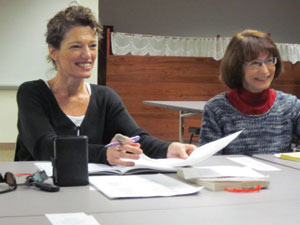 In June the Jewish Community Center launched its new Jewish Life and Learning program by offering a taste of its fall programming. The new classes are now in place, a brochure is in the mail and fall programming will officially begin on Monday, Aug. 29. The brochure, “Jewish Life & Learning for the Curious Mind,” can also be accessed online at www.jcckc.org.
In June the Jewish Community Center launched its new Jewish Life and Learning program by offering a taste of its fall programming. The new classes are now in place, a brochure is in the mail and fall programming will officially begin on Monday, Aug. 29. The brochure, “Jewish Life & Learning for the Curious Mind,” can also be accessed online at www.jcckc.org.
Jill Maidhof, the director of Jewish Life and Learning, explained that the change in name and the larger variety of class offerings is the result of a survey conducted by the JCC last spring.
“We sent a survey probing every aspect of what was then called the Department of Adult Jewish Learning to participants, faculty and other stakeholders, like funders. We carried on personal conversations with a variety of those people as well as thought leaders across the country and colleagues at different JCC’s,” she explained.
From the survey and conversations, the JCC decided to expand the scope of programming it offered beyond adult Jewish learning.
“In addition to formal classes, lectures and presentations people thought informal venues, recreational programming that focused on Jewish values and traditions, family programs, spirituality and personal development workshops, things like cooking, cultural arts emerged as a very important priority for folks.”
Besides enlarging the focus of its educational programming in a variety of ways, Maidhof pointed out the JCC has embraced a more collaborative approach to programming.
The first effort was to meet with representatives of the Jewish Federation of Greater Kansas City, which occurred early this year.
“Basically we said we are seeking the same ends, we are working with the same target audience, heck we are even in the same building. We could be far more than the sum of our parts and we have a great opportunity to work closer together,” Maidhof said.
Since the initial meeting Maidhof, Federation Associate Executive Director Alan Edelman and their staffs have begun to work together in co-promoting and planning and implementing programs.
Edelman explained that this collaborative concept, similar to the saying “it takes a village!” is happening in Jewish communities throughout North America.
“Jewish communities are coming to appreciate the value of collaboration as an effective means of engaging more members of the community along a lifetime continuum of Jewish living and learning experiences,” he said.
One of the reasons for this, he explains, is that at various stages of life, individuals may or may not be affiliated with a particular Jewish institution.
“Therefore, every Jewish organization, including the Jewish Federation, Jewish Community Center and congregations must offer a variety of activities that will create a net wide enough to catch every member of the community at one time or another. Hopefully, that initial activity will be meaningful enough to engage the person for the rest of their lives,” Edelman said.
“This new and evolving collaboration is our community’s attempt at bringing professional and volunteer leadership together to brainstorm ideas and implement programming.
We encourage members of the community to share their ideas for engaging more people in Jewish living and learning,” he added.
One of the first things the JCC did was invite the congregations, agencies and organizations in the community to submit their programs for publication in the brochure which has just been published. To be included a program needed to meet three criteria:
It had to be focused on Jewish content
It had to be open to the community without regard to membership or affiliation
It must take place between mid-August and December of this year.
Maidhof said that invitation resulted in a 33-page document “that really shows the breadth of what’s available in this city.”
The brochure is not meant to be the only resource for community programs. For instance some plans weren’t finalized before publication.
“We are strongly encouraging people to see it as a companion to Planit Jewish, the online Jewish calendar. But it’s a great example of reaching out and taking a step in the direction of more and more collaboration and better and more efficient use of community resources,” she said.
A couple of classes organized by the JCC will be held at sites other than the JCC this year. For example an Ayeka class will be held at Congregation Beth Torah. A cooking class is scheduled to be held at The Temple, Congregation B’nai Jehudah.
Maidhof is hopeful more and more collaboration will take place in the future.
“Right now we are in the stage of reaching out and looking at what’s possible,” Maidhof said.
Maidhof to lead JCC’s
Jewish Life and Learning program
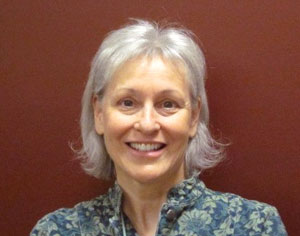 After almost 25 years holding a variety of positions at the Jewish Community Center, Jill Maidhof has assumed the full-time position of director of Jewish Life and Learning.
After almost 25 years holding a variety of positions at the Jewish Community Center, Jill Maidhof has assumed the full-time position of director of Jewish Life and Learning.
Most recently she has served as the JCC’s associate executive director and served as interim director, along with Director of Finance Jim Sluyter, for an eighteen-month period before Jacob Schreiber joined the JCC in the fall of 2009.
Schreiber said what stands out about Maidhof is her love of Judaism and her passion for bringing its values, wisdom and sense of community to all people.
“That is what drives her. That is why she has served in just about every position there is in the JCC — because each one, when done correctly and with dedication, can positively impact the lives of so many,” he said.
In addition to her regular duties, Maidhof, who joined the JCC in October of 1986, had been serving as the interim director of Jewish Life and Learning since Jeff Goldenberg left the JCC in April. It was during that time that Maidhof decided she would once again enjoy a position that was more hands on and less administrative.
“I was reminded of how much I loved my years as a Jewish educator and the process of creating programs,” Maidhof said.
This new position allows Maidhof to return to a “long-time passion and leave a legacy of excellence in one focused area.”
“For many years, I had the privilege of learning first-hand about operations in many parts of the Center,” said Maidhof. “Now I’m excited to delve deeply into one area.”
Melton undergoes changes
Following an extensive study of adult educational programming at the Jewish Community Center undertaken last spring, the year one curriculum of the Florence Melton Adult
Mini School will be offered this fall in three 10-week units. In the past it has been offered as a year-long course. No changes are being made to the year two Melton curriculum this year.
Jill Maidhof, director of the JCC’s Jewish Life and Learning department, said the survey and one-on-one discussions with educators and students found that people unanimously believe that there is no better adult curriculum than Melton.
“It’s the best there is for the community setting,” she said.
However the survey did bring to light that on a local level repackaging Melton might better meet the needs of its target audience. One reason for that, Maidhof said, is people are becoming more resistant to making a commitment for an entire year.
“They may go out of town for several weeks at a time. It’s also a significant financial commitment,” she said.
The JCC worked with the international Melton faculty and will pilot the three, 10-week units this year. While the course has been designed by Rabbi Morey Schwartz, the curriculum developer for Melton, to stand alone Maidhof believes students will get the greatest benefit by taking all three sessions.
“Our hope is to hook people early and keep them in the system. We think with excellent teachers that’s exactly what will happen. But we also are very respectful that people have many concurrent priorities,” Maidhof.



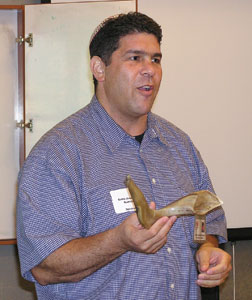 Day of Discovery, now in its fifth year, gives adults in the Kansas City Jewish community a chance to discover what types of educational opportunities are offered through the year. In just one day, Sunday, Aug. 28, somewhere between 225 and 300 people will take the opportunity to learn, study and “discover” with some of the community’s finest Jewish educators, rabbis and cantors.
Day of Discovery, now in its fifth year, gives adults in the Kansas City Jewish community a chance to discover what types of educational opportunities are offered through the year. In just one day, Sunday, Aug. 28, somewhere between 225 and 300 people will take the opportunity to learn, study and “discover” with some of the community’s finest Jewish educators, rabbis and cantors.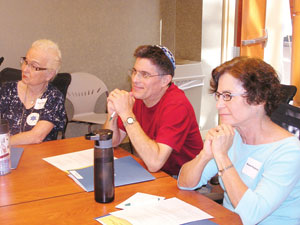 A total of 30 different classes are being offered by 29 different educators. Fish noted that many of the courses offered this year were chosen in response to the evaluations organizers received from last year’s participants. Two examples of that are “The Holocaust: From Persecution to Annihilation,” taught by Fran Sternberg, director of programming for the Midwest Center for Holocaust Education, and two courses on genealogy to be taught by professional genealogist Steven B. Chernoff, Ph.D.
A total of 30 different classes are being offered by 29 different educators. Fish noted that many of the courses offered this year were chosen in response to the evaluations organizers received from last year’s participants. Two examples of that are “The Holocaust: From Persecution to Annihilation,” taught by Fran Sternberg, director of programming for the Midwest Center for Holocaust Education, and two courses on genealogy to be taught by professional genealogist Steven B. Chernoff, Ph.D.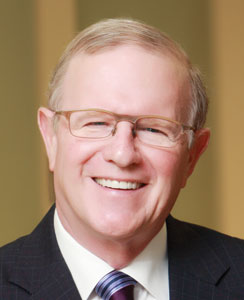 Recently, philanthropist and volunteer Stan Bushman asked Bill Carr, “What are you going to do now?”
Recently, philanthropist and volunteer Stan Bushman asked Bill Carr, “What are you going to do now?”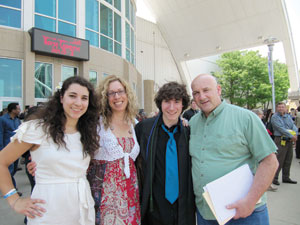 Mai and Aviv Bonomo moved to Kansas City from Israel with their parents, Anat and Yossi Bonomo, when they were just 4 years old. The twins graduated from Blue Valley High School in May. Each decided to return to Israel — Mai left in late July and Aviv is leaving this month — to begin the next chapters of their lives.
Mai and Aviv Bonomo moved to Kansas City from Israel with their parents, Anat and Yossi Bonomo, when they were just 4 years old. The twins graduated from Blue Valley High School in May. Each decided to return to Israel — Mai left in late July and Aviv is leaving this month — to begin the next chapters of their lives. “We have two choices in life,” said JoAnn Oppenheimer. “Cope or don’t cope.” This saying, that she learned from her father, Harry Oppenheimer, has helped her through many of life’s challenges. As Oppenheimer puts it, she has always chosen to cope!
“We have two choices in life,” said JoAnn Oppenheimer. “Cope or don’t cope.” This saying, that she learned from her father, Harry Oppenheimer, has helped her through many of life’s challenges. As Oppenheimer puts it, she has always chosen to cope! While she wrote her book, Oppenheimer continued other activities. She has always been active in both community and political activities. For 10 years she served on the Nevada State Architecture, Interior Design and Residential Design Commission. In Las Vegas, she also served on the Jewish Community Center board, Women’s Philanthropy Jewish Federation and the Jewish National Fund.
While she wrote her book, Oppenheimer continued other activities. She has always been active in both community and political activities. For 10 years she served on the Nevada State Architecture, Interior Design and Residential Design Commission. In Las Vegas, she also served on the Jewish Community Center board, Women’s Philanthropy Jewish Federation and the Jewish National Fund.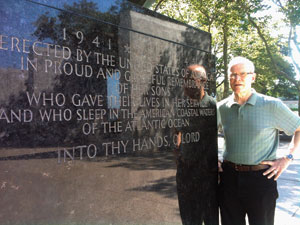 MILITARY HONOR — A memorial to those who lost their lives or went missing in the western waters of the Atlantic Ocean during World War II was dedicated by President John F. Kennedy in 1963, but somehow that information didn’t make it to all the families of those whose names appear on the memorial. Not too long ago when Pete Rosen was researching family history, he learned about the East Coast War Memorial, located in New York City’s Battery Park. This summer his father, Herb Rosen, a career Army officer who retired as a lieutenant colonel after serving 21 years, and his mother, Bonnie, visited the memorial because the name of Herb’s uncle, Charles Rosen, is one of the 4,600 names inscribed on it. The memorial is huge, featuring four 19-foot pylons, but Herb was able to find the name he was looking for, listed as Charles Rosen, Master Sergeant, U.S. Army, Missouri. He was on a ship that was lost at sea in 1942. Charles Rosen’s youngest sister, Sue Singer, is his last surviving sibling and still lives in the Kansas City area. Serving our country runs in the Rosen family as Pete is a graduate of the Military Academy at West Point.
MILITARY HONOR — A memorial to those who lost their lives or went missing in the western waters of the Atlantic Ocean during World War II was dedicated by President John F. Kennedy in 1963, but somehow that information didn’t make it to all the families of those whose names appear on the memorial. Not too long ago when Pete Rosen was researching family history, he learned about the East Coast War Memorial, located in New York City’s Battery Park. This summer his father, Herb Rosen, a career Army officer who retired as a lieutenant colonel after serving 21 years, and his mother, Bonnie, visited the memorial because the name of Herb’s uncle, Charles Rosen, is one of the 4,600 names inscribed on it. The memorial is huge, featuring four 19-foot pylons, but Herb was able to find the name he was looking for, listed as Charles Rosen, Master Sergeant, U.S. Army, Missouri. He was on a ship that was lost at sea in 1942. Charles Rosen’s youngest sister, Sue Singer, is his last surviving sibling and still lives in the Kansas City area. Serving our country runs in the Rosen family as Pete is a graduate of the Military Academy at West Point.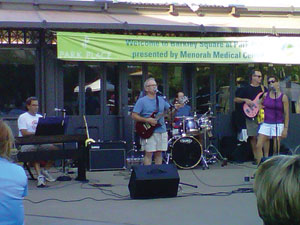 FUN EVENING — Leslie Mark reports that a fun night was had by all Aug. 4 at The Cheap Dates concert, part of the Thursday Night Summer Concert Series at Park Place. The band is made up of Toni Dodd, lead vocals; Max Berry, guitar/lead vocals; Dee Pack, guitar/vocals; Jimmy Rosenbloom, keyboards/vocals; Steve Cole, bass guitar/vocals; and Jeff Daniels, drums/vocals. “The best moment was seeing Skipper Feingold, with her nurse in tow, tapping her feet to the rock and roll — and then getting up and dancing,” Mark said. There’s only one more concert there this summer, from 6 to 8 p.m. tonight, Aug. 11.
FUN EVENING — Leslie Mark reports that a fun night was had by all Aug. 4 at The Cheap Dates concert, part of the Thursday Night Summer Concert Series at Park Place. The band is made up of Toni Dodd, lead vocals; Max Berry, guitar/lead vocals; Dee Pack, guitar/vocals; Jimmy Rosenbloom, keyboards/vocals; Steve Cole, bass guitar/vocals; and Jeff Daniels, drums/vocals. “The best moment was seeing Skipper Feingold, with her nurse in tow, tapping her feet to the rock and roll — and then getting up and dancing,” Mark said. There’s only one more concert there this summer, from 6 to 8 p.m. tonight, Aug. 11.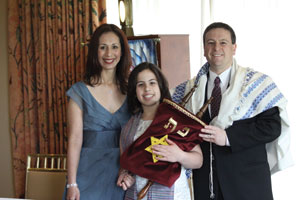 Temple Israel of Greater Kansas City, the new Reform congregation which held its first service in Overland Park on April 1, has signed a lease with Congregation Ohev Sholom to hold worship services, classes and events at the synagogue’s building located at 75th Street and Nall Avenue in Prairie Village. Temple Israel will conduct its first Shabbat service at Ohev tomorrow evening (Friday, Aug. 5) at 6 p.m. The one-year lease has renewable options. Since its inception it has been holding services at St. Thomas the Apostle Episcopal church in Overland Park.
Temple Israel of Greater Kansas City, the new Reform congregation which held its first service in Overland Park on April 1, has signed a lease with Congregation Ohev Sholom to hold worship services, classes and events at the synagogue’s building located at 75th Street and Nall Avenue in Prairie Village. Temple Israel will conduct its first Shabbat service at Ohev tomorrow evening (Friday, Aug. 5) at 6 p.m. The one-year lease has renewable options. Since its inception it has been holding services at St. Thomas the Apostle Episcopal church in Overland Park.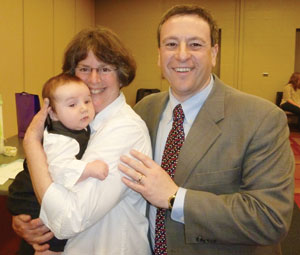 In addition to searching for a home, members of the TI interim board — including Resnick, Erin Margolin (president), David Seldner (secretary), Deb Trout (treasurer), Andrew Bergerson, Denisse Cukierkorn, Joyce Fulps and Linda Walts — have been preparing to have a full slate of programs beginning this month. The first will be a congregational trip to Joplin, Mo., on Aug. 12. TI congregants will worship and visit with members of The United Hebrew Congregation, who are still suffering the effects of the deadly May tornado.
In addition to searching for a home, members of the TI interim board — including Resnick, Erin Margolin (president), David Seldner (secretary), Deb Trout (treasurer), Andrew Bergerson, Denisse Cukierkorn, Joyce Fulps and Linda Walts — have been preparing to have a full slate of programs beginning this month. The first will be a congregational trip to Joplin, Mo., on Aug. 12. TI congregants will worship and visit with members of The United Hebrew Congregation, who are still suffering the effects of the deadly May tornado. What kind of community do you want to live in?
What kind of community do you want to live in?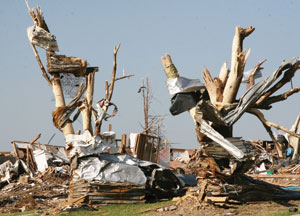 The Jewish Federation of Greater Kansas City and Jewish Federation of St. Louis continue to help victims of tornado-ravaged Joplin, Mo., through emergency relief fundraising efforts. To date, the two Jewish federations have raised $226,000 — $176,000 by the Jewish Federation of Greater Kansas City and another $50,000 by the Jewish Federation of St. Louis.
The Jewish Federation of Greater Kansas City and Jewish Federation of St. Louis continue to help victims of tornado-ravaged Joplin, Mo., through emergency relief fundraising efforts. To date, the two Jewish federations have raised $226,000 — $176,000 by the Jewish Federation of Greater Kansas City and another $50,000 by the Jewish Federation of St. Louis.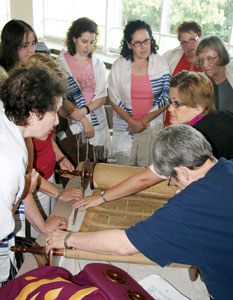 For seven years Congregation Beth Torah has hosted a women’s retreat for Rosh Hodesh Elul. For five years, the same three women, along with Rabbi Vered Harris, have come together to plan it. The women — Hedy Goldman, Judy Kass and Maureen Salz — each play a different role in making the event a success.
For seven years Congregation Beth Torah has hosted a women’s retreat for Rosh Hodesh Elul. For five years, the same three women, along with Rabbi Vered Harris, have come together to plan it. The women — Hedy Goldman, Judy Kass and Maureen Salz — each play a different role in making the event a success.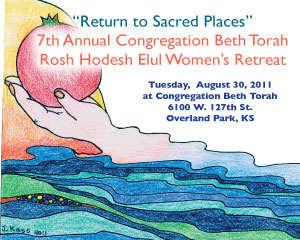 Now the four women who plan the event have the program set, each one playing an important role.
Now the four women who plan the event have the program set, each one playing an important role.